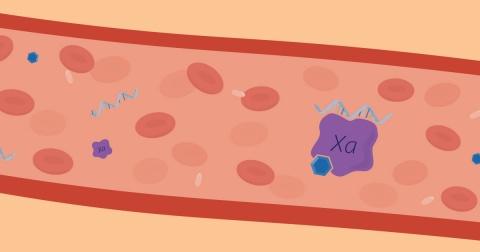
In a research study published in Nature Biotechnology, Duke researchers report that they have found a safer way to prevent blood clotting, and reverse the effects, in patients undergoing surgery using cardiopulmonary bypass (CPB).
For decades, the standard anticoagulant used during CPB surgery has been unfractionated heparin (UFH), a medication derived from a naturally occurring chemical in the body. Despite the effectiveness of UFH in preventing clots during surgery, post-operative risks can be high, including a low platelet count and increased bleeding. An alternative method would benefit the more than one-million patients that undergo CPB each year.
Bruce Sullenger, PhD, Professor of Surgery in the Division of Surgical Sciences, is a co-author in the recent study that tested the efficacy of a more fine-tuned approach to anticoagulation.
The study analyzed the use of an RNA aptamer, a synthetic molecule named 11F7t, combined with a catalytic site FXa inhibitor, a drug that inhibits the clotting process. The combination provides a one-two punch, inhibiting the body’s natural response to clotting from injury and controlling thrombin generation more effectively than UFH. Moreover, similar to UFH treatment, the combination is reversible: an antidote will neutralize its effects, preventing excessive bleeding during the recovery stage after surgery.
The paper, titled “Combination of aptamer and drug for reversible anticoagulation in cardiopulmonary bypass,” was published on Nature’s website in June 2018. Along with Dr. Sullenger, researchers from Duke include Ruwan Gunaratne, James Frederiksen, Jens Lohrmann, Kristin Bompiani, and Gowthami Arepally. Researchers from collaborating institutions include Shekhar Kumar, Steven Stayrook, Kay Perry, Charlene Chabata, Nabil Thalji, Michelle Ho, Rodney Camire, and Sriram Krishnaswamy.